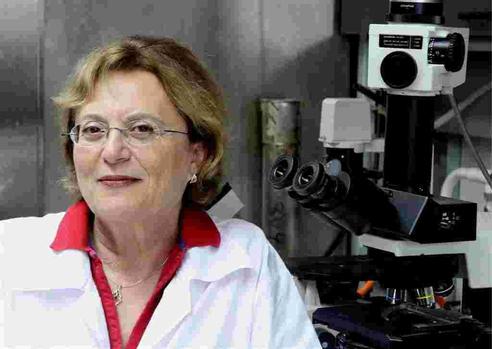The first review in a series that will deal with the developments of the universities' implementation companies that will be presented at the Biomed conference, June 15-17, David Intercontinental Hotel, Tel Aviv and this time - developments of Ramot (Talo) and Yishim (Hebrew)

In preparation for the opening of "Israel Biomed Week 2009" (June 15 to 17, David Intercontinental in Tel Aviv) we set out to check what is 'cooking' in the technology commercialization companies of the Israeli academy. What are the hottest developments, what are the hot innovations that we will soon see in their industrial version.
By: Efrat Barak
* (The writer specializes as part of her activity at "Donitza Communications - DMC", in the field of biotechnology and medical devices)
Ramot - Tel Aviv University
Ramot Lid Tel Aviv University Ltd. is the technology commercialization company of Tel Aviv University. Ramot, established in 1973, initiates, leads and manages the transfer of technologies created within the framework of academic research from the university laboratories to industry. Ramot manages all commercialization activities from the stage of patent protection for the inventions of the faculty members and research students, to the granting of licenses to the relevant industrial entities. Ramot functions as the professional interface between innovative scientific discoveries and the business community in diverse fields of activity (life sciences, medicine, exact sciences, and engineering). Company Website:
Hope for the eradication of colon cancer
Dr. Rina Rosin-Erbsfeld from the Department of Anatomy and Anthropology at the Sackler Faculty of Medicine at Tel Aviv University is now testing her new and promising genetic drug for the treatment of a very deadly cancer - colon and rectal cancer.
Rosin-Erbsfeld's revolutionary treatment uses a certain type of antibiotic to disable mutations in a gene called APC, a gene whose normal action actually suppresses the appearance of tumors.
A large number of colon and rectal cancer patients suffer from stop mutations in the APC gene. These mutations change an amino acid into a "stop sign", which impairs the expression of the APC gene, and prevents this gene from fulfilling its role: suppressing the tumor. As a result, the body unknowingly allows the growth of polyps, and if they are not removed in time, it is almost impossible to prevent them from becoming cancerous.
"In our innovative treatment, we try to make the cell ignore the 'stop sign' and create a functional APC protein," says Rosin-Erbsfeld. Tests done in the laboratory were able to shrink polyps and restore function to the APC gene.
Rosin-Erbsfeld's work is done with the help of a laboratory team of eight students, who consider their work a sacred work, and with the support of Tel Aviv University's "Colton Institute for Next Generation Technologies" and the "Nofer Program" of the chief scientist at the Ministry of Science and Technology.
Preventing blood supply to cancerous tumors
Faculty member Dr. Ronit Sachi-Painero and her students are developing advanced, dedicated drugs that prevent the blood supply to malignant tumors, thus causing them to shrink and "starve to death", or at least stop growing.
Malignant tumors develop new blood vessels, in a process called angiogenesis, to fuel their growth. The drugs developed so far to destroy this supply line are toxic to the patient. Sachi-Painero and her colleagues in the laboratory of the Department of Physiology and Pharmacology at the Sackler Faculty of Medicine, developed a family of new drugs whose action is intended to be selective, that is, to inhibit the development of the blood vessels of the tumor, without poisoning other parts of the body. Such drugs hold real promise for developing the ability to keep tumors in a state of permanent dormancy and turn cancer into a chronic disease under control.
Sachi-Finero believes that its revolutionary therapeutic approach will have additional applications, including new treatments for retinal diseases caused by diabetes or old age and causing blindness (AMD, Diabetic Retinopathy), rheumatism and various inflammations - all these diseases also depend on the angiogenesis process.
The group of drugs she developed, which is now in the stages of active business development, was supported by the National Science Foundation, the US-Israel Binational Foundation and the Israel Cancer Society.
Medical implants with added value

The research of Dr. Mittal Zilberman from the Department of Biomedical Engineering at the Fleishman Faculty of Engineering at Tel Aviv University holds a chance to change from end to end a wide variety of fields - from burn treatment to the regeneration (rehabilitation) of bones and tissues. Dr. Zilberman is developing a new generation of medical implants with biological properties that allow the controlled release of drugs and protein molecules into the tissues around them.
In the field of wound healing, Silberman and her team are developing an advanced artificial skin implant capable of delivering antibiotic drugs directly to burns and wounds. "75 percent of deaths resulting from severe burns in large parts of the body are the result of infection," Zilberman says. Our "artificial skin", produced from a combination of thin surfaces and biodegradable polymer fibers, effectively fights infection by transferring antibiotic substances directly into the affected area.
In the field of cardiovascular diseases, the team develops innovative biodegradable coatings for arterial stents capable of releasing drugs to prevent restonosis - a common phenomenon after surgery. The system releases the drug molecules into the blood vessel wall in a controlled manner.
Another interesting development developed in Dr. Zilberman's laboratory is the design of "scaffolds" and bones for the regeneration (rehabilitation) of soft and hard tissues. The team's unique biodegradable scaffolds serve as a support or replacement for damaged or missing tissues, and they include molecules that promote their healing and even enable the creation of new tissues.
Dr. Zilberman's research won a research award from the Yoloden Foundation. The award is given by the Technion for outstanding research work that focuses on the application of the exact sciences in the field of medicine.
The growth of new blood vessels
On the horizon of the experiments is the research of Dr. Brita Hardy and Prof. Alexander Butler from the Felsenstein Medical Research Center of Tel Aviv University. Their work promises a completely new treatment path for cardiovascular diseases.
For the past six years, they have been researching the phenomenon of angiogenesis - the growth of new blood vessels - in order to prevent necrosis in organs affected by a lack of oxygen. In laboratory experiments, the two were able to restore blood flow to tissues where the blood circulation is not normal by injecting unique peptides. These caused the formation of new replacement blood vessels.
Hardy compares the discovery of these peptides - small, new protein molecules - to the discovery of a needle in a haystack. The advanced technologies at our disposal make it possible to choose the right peptide from a pool that includes a billion combinations of amino acids (the building blocks of proteins).
These peptides were also found to be effective for recruiting stem cells from the bloodstream that are similar in their properties to cells that line blood vessels and may be used to coat stents used to support blood vessels following blockage. Hardy explains that one of the main problems with stents today is blood clots, which form a blood clot (thrombosis), which may form inside them and endanger the patient. "In the laboratory, we proved the ability of our peptides to cause the growth of a membrane of arterial tissue that will cover the stent from the inside. The membrane may prevent the formation of blood clots, similar to the process that exists naturally in blood vessels."
The research was supported by the Tel Aviv University Fund for Applied Research, as well as the joint support of Tel Aviv University's Colton Institute for Next Generation Technologies and Johnson & Johnson.
All technologies are in a pre-clinical stage and in various stages of commercialization by Ramot. Ramot is looking for business partners in Israel and the world to take the technologies / products under license in order to develop them up to the market.
center of power
"Tel Aviv University is a center of power for the commercialization of drug innovation, especially in relation to the treatment of diseases of the central nervous system," says Dr. Ze'ev Weinfeld, CEO of Ramot, Tel Aviv University's technology commercialization company. In the field of drugs for Alzheimer's disease alone, Ramot has already licensed six technologies that are in several stages of development - from the pre-clinical trials stage to the advanced clinical tests. Three of them were developed in the laboratory of Prof. Becca Salomon, one of the pioneering researchers in the treatment of the disease and one of the fifty most influential scientists in the world for 2007 selected by Scientific American magazine.
"We are full of confidence and optimism that from these technologies we will see a drug on the market that will help patients and their families fight this terrible disease," says Weinfeld.
Application, the Research Development Society of the Hebrew University of Jerusalem
A breakthrough in the treatment of osteoporosis
Professor Itai Bab from the Bone Laboratory at the Faculty of Dentistry, and Professor Raphael Meshulam from the School of Pharmacy at the Hebrew University of Jerusalem, discovered a new molecule that could be a breakthrough in the treatment of osteoporosis (bone loss). The drug has been successfully tested in preclinical tests and is capable of both inhibiting bone resorption and encouraging its regeneration. The intended drug works through the activation of a cannabinoid receptor, which is a protein involved in preventing bone loss that occurs with age. The substance has no psychotic effects. The invention is protected by several application patents, the research development company of the Hebrew University of Jerusalem, which is looking for strategic partners for investment and product development.
"As the world's population continues to age, osteoporosis is becoming a major obstacle that impairs the quality of life of millions of people," noted Yaakov Michlin, CEO of Ipsos. "Unfortunately, we have not yet won the battle against the disease. The new invention by Professors Bab and Shulam meets an urgent need for new drugs that can encourage bone building, and advances us a significant step towards eradicating the disease."
Osteoporosis is a disease characterized by an imbalance between bone formation and bone resorption. This imbalance causes bone depletion and an increased tendency to fractures. Most of the osteoporosis drugs on the market prevent bone resorption and are mainly used to prevent bone loss after menopause in women. Also, the use of Teriparatide, the only drug approved as a bone builder, is limited to 18 months for fear of the development of bone cancer and the development of resistance to the drug.
Osteoporosis is the most common degenerative disease in developed countries. The number of patients is expected to reach about 50 million in 2015. One out of every three women and one out of every 5 men will suffer from osteoporotic fractures. In fact, the total lifetime risk of an osteoporotic fracture is about 40%, similar to the risk of having heart disease. The human and economic cost of osteoporosis is enormous. In Europe, the rate of disability due to osteoporosis is greater than that of most types of cancer. The value of the global market for drugs to prevent and treat osteoporosis is approximately $10 billion and continues to grow rapidly.
T3 - the Technion's technology transfer company - a tiny crawling robot (See previous news)
